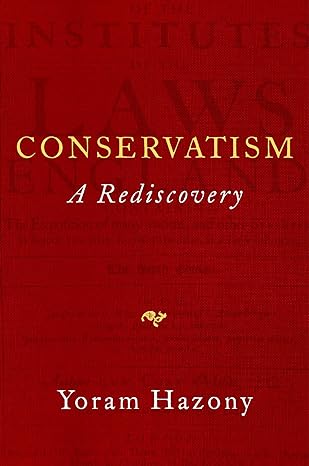
In his new book, Conservatism: A Rediscovery, Yoram Hazony argues that liberal democracy is not the only option for a viable system of government. Indeed, he doubts that liberal democracy is viable at all. Instead, he proposes an alternative he calls conservative democracy. In making this proposal, Hazony is not calling for the wholesale establishment of a new system, but rather a reestablishment of American governance to its original form. Establishing conservative democracy would, in a sense, be a revolution but, according to Hazony, in the original sense by which that term was taken, “describing something that ‘revolves’ and finally returns to its rightful place—in effect, a restoration.”

Conservative democracy would be formed by the principles of historical empiricism, meaning an adherence to “constitutional traditions known, through the long historical experience of a given nation, to offer stability, wellbeing, and freedom”, nationalism, the centering of political life around “national collectives characterized by bonds of mutual loyalty and unique inherited traditions”, religion, under the notion that shared religious traditions “are essential to the national heritage and are indispensable for justice and public morals”, while ensuring “the state offers toleration to religious and social views that do not endanger the integrity and well-being of the nation as a whole”, limited executive power, where “the powers of the chief executive are limited by the representatives of the people”, and individual freedoms, which are “the basis for a society that is both free and prosperous” and such freedoms “may be infringed upon only by due process of law.”
Even the more controversial elements on this list, like the idea of religious nationalism, are things that would only represent a return to the original ideas of the United States. Hazony quotes various prominent political and public figures, as well as court rulings, from the American Founding all the way through the Second World War who all uphold and affirm the idea that America is a Christian nation, and that public policy is meant to reflect that. Even FDR declared America’s success was owed to it being among the “nations which still hold to the old ideals of Christianity and democracy.” And in describing the conflict unfolding throughout the world, FDR said in his 1939 State of the Union that events “abroad directly challenge three institutions indispensable to Americans, now as always. The first is religion. It is the source of the other two – democracy and international good faith.” Roosevelt would go on to say “An ordering of society which relegates religion, democracy, and good faith among nations to the background can find no place within it for the ideals of the Prince of Peace. The United States rejects such an ordering and retains its ancient faith.” Even up to the Second World War, and even in an administration like FDR’s, it was widely and openly admitted that religion was the source of American governance, and something that must be at the forefront rather than background of American life.
Hazony points out that it was only in the 1960s that religious teaching and prayer were banned from public schools. This shows that the idea of secular government is not a longstanding American institution, but rather a relatively recent aberration from the original system. Hazony goes on to say “what is now called ‘liberal democracy’ refers not to the traditional Anglo-American constitution but to a rationalist reconstruction of it that has been detached from its historical empiricism, Christian religion, and the Anglo-American nationalist tradition. Far from being a time-tested form of government, this liberal-democratic ideal is something new to both America and Britain, establishing itself as authoritative only in recent decades.”
In light of the increasingly fractured state of liberal democracies he sees, Hazony, ever the empiricist, says that the “claim that liberal-democratic regimes of this kind can be maintained for long without the conservative principles they have discarded is a hypothesis that America and other Western nations have tested for the first time in the last sixty years…The experiment has run its course and we now know that the Enlightenment-liberal hypothesis was false. A political regime founded on Enlightenment liberalism cannot sustain itself for even three generations.” Conservatism teaches that when an experiment goes awry, we must restore things to the way they were before the disfunction arose. For that reason, we must rediscover and restore the ideas of conservative democracy.
Most importantly, Hazony argues, is that conservatism and the ability to live a conservative life holds the possibility to restore meaning and purpose to a generation that seems lost and listless. Today’s generation has grown up in a time with the fewest social constraints on how to live, with more freedom and more choice available to them, free of judgment, than at any time in the past. But that hasn’t made todays youth any happier, or more content, or filled with a sense of meaning in purpose – if anything, this appears to be an extremely depressed and unhappy generation. Liberalism lacks the tools to help people forge a meaningful life, therefore those who have “been told all their lives that they are ‘free to choose’ whatever course they please” instead “find it increasingly difficult to choose any course at all.” But conservatism is not neutral between life choices – a conservative philosophy will hold some ways of life better than others, and this knowledge of how to live a good life, developed through generations of time-tested experience, gives people structure, purpose, and meaning.
“When we live in a hierarchy to which we are loyal,” Hazony writes, “we strive to be honored by those who are important in this hierarchy: by parents and other older relations, political figures, military commanders, employers, clergy, teachers, and so on. Through this striving, we shape ourselves, building up and refining our abilities and achieving things we hope will be worthy in their eyes, in this way becoming worthy in our own eyes as well.” This is a demanding life, but it offers “paths that lead to an honorable life in which all slipperiness and evasion ceases and one is able to make one’s way with confidence and pleasure. These paths offer much more than honor. They offer purpose, meaning, direction, health, knowledge and skill.” But by failing to uphold the time-honored institutions and customs of a society, liberalism robs people of these opportunities. For when “we do away with the norms that give the individual direction and purpose, the individual is plagued by an inability to distinguish what is honorable from what is dishonorable, and what is worthy from what is unworthy…And so society comes to be characterized by the decadence of the individual, who is drowning in a sea of alternatives – none of which matter to anyone.” But in living a conservative life, receiving and embracing the customs, constraints, and inherited traditions from previous generations and passing these down to the next generation, creates the possibility of “healing a ravaged family and community, tribe and nation, reviving norms of behavior and a common sense that had been given up for dead.” To restore the conservative tradition, one must live the conservative life, for “Conservatism begins at home.”
This concludes my summary of Hazony’s book. In my next posts, I will offer some thoughts and critiques of his case.

READER COMMENTS
Richard Fulmer
Nov 20 2023 at 3:08pm
I agree that we need to return to the Constitution and (though Hazony doesn’t understand this) to the Scottish Enlightenment ethos on which it was based.
This means, as Hazony suggests, returning to a government limited to performing the duties enumerated by the Constitution. It also means getting the federal government out of education altogether, and not just reintroducing government-approved prayers in government-approved schools. It means getting the federal government out of orchestrating charity at the national level. It means getting government out of healthcare and out of retirement savings programs. It means getting government out of the business of awarding special privileges to politically-favored individuals, companies, and institutions. It means keeping the government from deciding which industries should be subsidized at the public’s expense. It means preventing government from deciding with whom individuals and companies can do business beyond the legitimate requirements of national security. It means peeling away the layers of regulation created by Progressive adherents to illiberal French Enlightenment ideals.
Enlightenment liberalism provides all the tools needed to preserve our nation: the Constitution and the free market. But those tools won’t work if we keep electing leaders who routinely ignore their oaths to preserve and protect the Constitution. They won’t work if we keep electing leaders who routinely offer us free goodies paid for by the “rich.” They won’t work if we routinely look to Washington to solve local problems rather than rolling up our sleeves and getting to work.
Comments are closed.